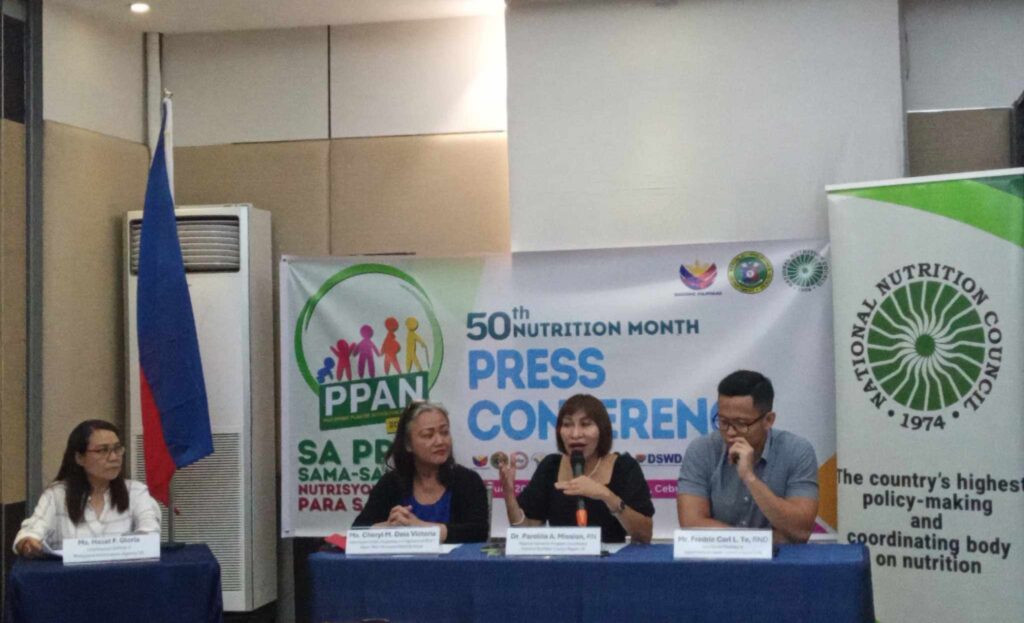Battling malnutrition effectively through multi-sectoral approach

(From left) Cheryl Dela Victoria, Information Chief of the Department of Agriculture (DA-7); Parolita Mission, NNC-7 Program Coordinator, and Fredric Te Department of Health (DOH-7) Nutritionist Dietitian, served as key speakers during the 50th Nutrition Month Press Conference in Cebu City on Thursday, June 20. CDN Digital photo/Shannah Rose Pardo
CEBU CITY, Philippines – A regional official from the National Nutrition Council in Central Visayas (NNC-7) said that a multi-sectoral approach is key to battling malnutrition, and winning the war.
Parolita Mission, NNC-7 Program Coordinator, said this during a press conference for the 50th Nutrition Month Press Conference in Cebu City on Thursday, June 20.
Alongside Mission, Cheryl Dela Victoria, Information Chief of the Department of Agriculture (DA-7), and Fredric Te Department of Health (DOH-7) Nutritionist Dietitian attended the conference as speakers.
READ:
PPAN Visayas presents plan to address malnutrition, food insecurity in 5 years
NNC-7: Stunting still a major nutrition issue in C. Visayas
The real cost of malnutrition
NNC-7 held the 50th Nutrition Month Press Conference where they discussed the need to address the issue of malnutrition with the cooperation of various sectors from both the local and national governments.
Parolita Mission, NNC-7 Program Coordinator, said during the conference that healthcare centers should not only be the ones implementing programs in battling malnutrition.
To solve the issue, a multi-sectoral approach is needed, saying that several factors contribute to malnutrition, which could only be solved through cooperation between different sectors in various fields.
Immediate factors that cause malnutrition
Mission said that among these factors are poor feeding or caring practices of the caregiver. This could be the mother, the father, the grandmother, or anyone who would care for the infant.
Another factor is the access to healthcare providers.
Although services are provided in barangay halls and healthcare centers, people don’t usually avail of these services. This issue is also one of the reasons why NNC-7 wants to educate them on the availability of these services to combat malnutrition, which they could access for free.
Mission emphasized that some of these provided health care services include free prenatal care like vitamins and supplements for maternal health. She added that these supplements should be taken by women throughout their pregnancy to lessen bleeding during childbirth.
However, people did not avail of these supplements due to their smell and taste.
Ideally, these supplements could be sugar-coated, but supplies in barangay health centers are not palatable because they purchased a cheaper version, though they are still the same in potency.
Moreover, food availability of the household is also one of the factors for malnutrition, because of food insecurity in the Philippines.
NNC-7 aims to address this by coordinating with the DA-7 in making sure to make each household food secure.
Cheryl Dela Victoria, Information Chief of DA-7, said that they are making sure that the available food is nutritious in every meal served to Filipinos.
The need for cooperation with gov’t agencies
Beyond DOH-7 and DA-7, the NNC-7 aims to collaborate with the Technical Education and Skills Development Authority (TESDA), where each family who has a baby aged under two years old, should have at least one member who would enroll in a TESDA program.
A TESDA study found that increasing a member’s income through vocational training will enable them to purchase food, a major step towards battling malnutrition.
Another is with the Department of Labor and Employment (DOLE-7), wherein they aim to improve the nutrition of workers.
According to Mission, productivity, especially among women in the workforce, increases when they take supplements like iron. Companies would also be encouraged to assist workers in increasing their productivity, like lactation stations in the workplace.
The Department of Environment and Natural Resources (DENR-7) is also one of the agencies they aim to collaborate with, as fruit-bearing trees like chico trees whose soil content is not healthy, would also decrease the nutrients found in these fruits.
NNC-7 also aims to engage with barangay officials in Central Visayas, through the Punong Barangay forum.
The Punong Barangay forum is a part of the month-long observance of the 50th Nutrition Month, which will hold its regional launch through a PPAN Service Caravan on July 1 at the City Wing, SM Seaside Cebu. This caravan would feature the different programs or services that PPAN is implementing, with an offer of first-hand experience of these services under PPAN.
The PPAN or the Philippine Plan of Action for Nutrition 2023-2028 is the government’s blueprint in addressing concerns on battling malnutrition in the next five years.
Disclaimer: The comments uploaded on this site do not necessarily represent or reflect the views of management and owner of Cebudailynews. We reserve the right to exclude comments that we deem to be inconsistent with our editorial standards.
